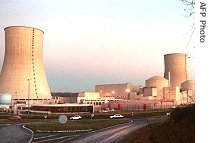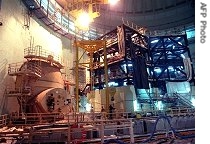2007年VOA标准英语-France Relies on Nuclear Power as Answer to Ene
搜索关注在线英语听力室公众号:tingroom,领取免费英语资料大礼包。
(单词翻译)
By Sonja Pace
Civaux, France
16 May 2007
Rising oil prices, the volatility1 of supplies, and need for alternative energy sources that will not add to climate change and global warming - these are issues increasingly in the public limelight, hotly debated at international conferences and gatherings2. While many countries are seeking to reduce their dependence3 on fossil fuels, France has already done so by turning to a very controversial source of energy - nuclear power. Today, as part of our weekly series "Searching for Solutions," we look at the use of nuclear energy. VOA's Sonja Pace visited France's most advanced nuclear power station in Civaux, western France, and has this report.
A bell tower, a church in the village square, small houses, and shops. Some would say this picturesque4 scene is typical of rural France.
 |
| General view of the Civaux power plant |
"We have two reactors6 in the plant," explains Pascal Maugey, the plant manager. "Each reactor5 produces 1,550 megawatts. That's the biggest reactor in the world. It's the newest plant in France and it's the most achieved technology."
The plant's two huge, and silent, cooling towers dominate this otherwise rural setting. So, how do local residents feel about living next door to a nuclear power station.
"It contributes a great deal to our little village and that's not a bad thing. It's now part of the countryside," says twenty-year-old Faiza, who works at Civaux's only bakery. "Anyway, if there is a risk, it is for everyone around here, not just our village. No, we're not afraid."
Six kilometers away in the somewhat larger community of Verrieres, innkeepers George and Edith Chevenault feel much the same.
Edith: "One just doesn't think about it. If we were right next to it [the plant], but we're kilometers away."
George: "No, we're not worried. Plus, it brings a lot of people here to the hotel, especially those working on the security and maintenance of the plant."
Verrieres' mayor, Jean-Claude Poiron, says people have become used to the plant, that they benefit from the taxes the electricity company pays to the local communities, and, he says, people believe nuclear power is necessary.
"Everyone can believe what he likes about energy issues," he said. "But reality is that we cannot go backwards7. We need more and more energy, and fossil fuels will run out. So, we believe that [nuclear-generated] electricity is crucial to allow us to become energy independent."
Energy independence was a crucial factor in the decision by French political leaders to embark8 on an ambitious nuclear energy program back in 1973, during the Middle East oil embargo9. France now has 58 nuclear power plants and derives10 nearly 80 percent of its electricity from them. All of the plants are operated by the national electricity company, EDF.
In Paris, financial analyst11 Patrice Lambert de Diesbach is head of research at CM-CIC Securities. He says nuclear energy is not just a matter of national pride. He says, because nuclear energy costs so much less than fossil fuels, it makes good economic sense.
"When you have real cost of energy, of electricity, which is around 25 Euros ($34) per megawatt hour to compare with the spot price, which is above 50 Euros ($68) per megawatt hour, you can easily understand that it will be crazy to stop nuclear [energy production]," he said.
 |
| View of reactor n1 at the Civaux nuclear power station (file photo) |
Xavier Renou, an environmental activist12 and member of the anti-nuclear group, Sortir du Nucleaire, says: "Our main concern is that although you may have the best technology, you still need people to handle them and whenever you have human beings, you have human mistakes. Can we afford a single mistake? We've seen what happened in Chernobyl."
Chernobyl inevitably13 comes up as proof of the dangers of nuclear power. The 1986 explosion at the Chernobyl plant in Ukraine - along with the subsequent radioactive contamination - is considered the worst nuclear accident in history.
Back in Civaux, plant manager Maugey says Chernobyl could not happen again.
"Some people don't agree with nuclear power plants, but most people in France know that nuclear power in France is not the same like in Chernobyl. We cannot have a big bang, an explosion," he said.
Maugey insists today's technology would prevent such accidents.
But opponents are not convinced and say France needs to look to other energy sources such as solar or wind power.
Financial analyst De Lambert-Diesbach says wind and solar power are not economically viable14. But he acknowledges nuclear energy carries risks and is no perfect solution.
"Nuclear is bad but in my view nuclear is a necessary disease," he said. "We cannot avoid nuclear. It's dangerous. But today nuclear is a less worse solution at least to provide electricity for poor countries and for rich countries because this is the cheapest way to get electricity today."
Aside from concern about nuclear accidents, there is the ever present problem of what to do with the end by-product15 of nuclear energy. In some places, spent nuclear materials are buried deep in the ground in remote locations.
Civaux plant manager Maugey says French scientists have found a way to recycle nuclear waste.
"More than 80 percent of the nuclear waste in France is recycled," he said. "We use uranium for the core of the reactor and after three years, the uranium goes to a treatment plant in France and we separate the little waste in plutonium and plutonium can be re-used in other plants."
Maugey says the more highly contaminated material, that cannot be recycled, is stored above ground, while a very small amount, two percent of all nuclear waste, is mixed with molten glass to be stored deep underground.
He, like many of his compatriots, puts his hopes in future technology that, some day, may be able to render radioactive material harmless.
And so, France forges ahead with its nuclear program.
While nuclear opponents argue that reliance on such a dangerous source of energy is sheer madness, supporters say that in a time of rising oil prices, the uncertain availability of energy resources and concerns about carbon pollution and global warming, the use of nuclear energy makes sense.
 收听单词发音
收听单词发音 




